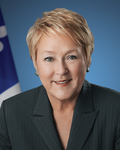|
2007 Parti Québécois leadership election
The Parti Québécois leadership election of 2007 elected the seventh leader of the Parti Québécois, the main political party to promote Quebec independence in Quebec, Canada, and was won by Pauline Marois. Former PQ Minister Pauline Marois was the first official candidate in the race. Marois ran in both previous PQ leadership races. In a high-profile move after Boisclair's resignation Gilles Duceppe, leader of the Bloc Québécois, had announced his candidacy but withdrew after witnessing sweeping overall support for Marois. Candidates had until June 26, 2007 to officially declare; no other candidate did so and Marois was acclaimed. UnfoldingBackgroundThe race was launched by the resignation of leader André Boisclair on May 8, 2007. After another emotional leader's departure, that of Bernard Landry, Boisclair was elected on November 15, 2005 with a majority of 53.7% on the first voting round. At that time, the governing party in Quebec City was dealing with unparalleled unpopularity under neoliberal Jean Charest's Liberal Party, the Sponsorship Scandal was badly hurting the Liberal federal government's standing and support for Quebec independence was at record highs. However, as the election date limit approached, Boisclair's popularity waned, a Conservative federal government claiming to be more conciliatory was elected (and made in-roads in Quebec after more than a decade of drought), the Liberal Party of Quebec gained back support by moving back towards the center and the Action démocratique du Québec rapidly gained popularity (as it had in 2002, only to lose it the year after), notably on the reasonable accommodation controversy. Boisclair impressed most analysts and PQ followers during the election campaign but, on March 26, 2007, the PQ was nonetheless sent back to a third party status at the National Assembly as the third party in number of seats. Opposition to Boisclair, already present before the election campaign, grew within his party. On May 4, at an interview taping of the SRC television programme Les coulisses du pouvoir, Boisclair claimed to believe in an attempt from Gilles Duceppe's entourage to unseat him so Duceppe can become the PQ leader. This event created a sizable amount of criticism from within the sovereigntist movement and prompted a surprised Duceppe to deny the allegations. Boisclair finally resigned on May 8, 2007. Despite the historical blow for the PQ to its representation in the National Assembly, independence retains a stable support around 45%. RaceThe race was launched at a time when finances for the party were relatively tight. On 11 May 2007, Gilles Duceppe issued a press release announcing his candidacy and Pauline Marois announced her own to the press minutes later. Pierre Curzi, an actor and former Union des artistes president, was a third name often mentioned by the media for a possible candidacy. Just 24 hours after his candidacy announcement, Gilles Duceppe chose to withdraw from the race.[1][2] His decision ensued from the sweeping popular support for Pauline Marois, as described in a CROP poll on La Presse's front-page the day after the announcement. In the poll, 45% of the respondents had chosen Marois and only 21% were for Duceppe.[3] A number of key Parti québécois MNAs also chose to support the former minister, thereby reducing Duceppe's chances. In a communique Duceppe declared he wanted to "avoid a duel which could divide and therefore weaken the sovereigntist movement".[4] Candidates
Polls
Timeline
See also
References
External links
|
||||||||||||||||||||||||||||||||||||||||||||||||||||||||||||||||||||||||||||||||||
Portal di Ensiklopedia Dunia
